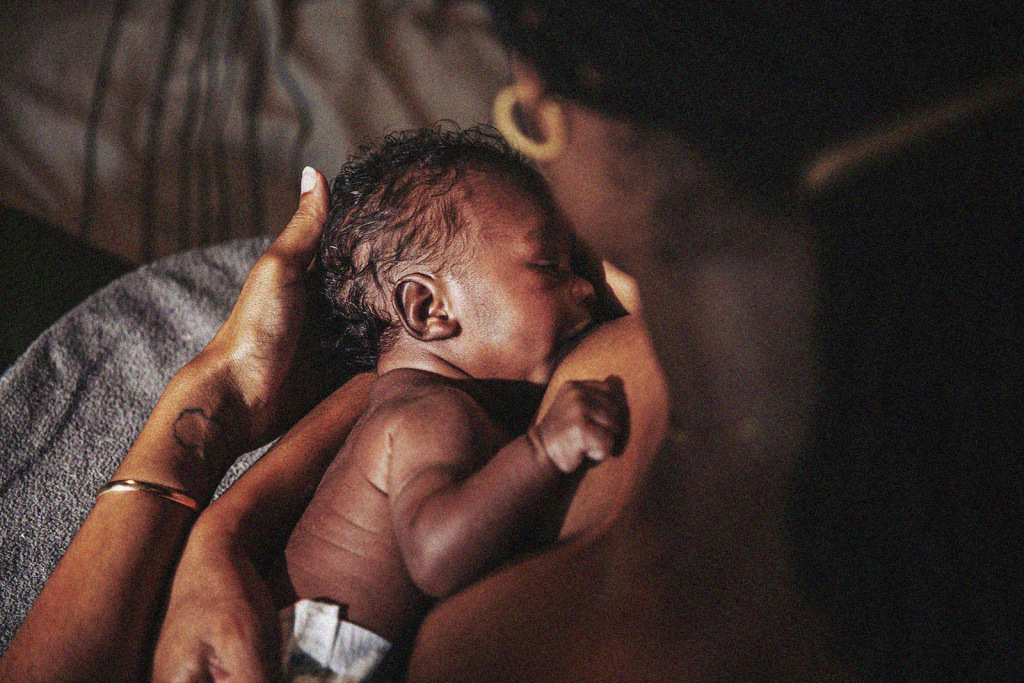Breastfeeding Resources for Black Moms
Here are online and IRL culturally competent support groups, doulas, birth centers, midwives and IBCLCs to support you on your breastfeeding journey
Along with the physical and emotional challenges all breastfeeding people encounter (looking at you, sore nipples), Black moms have the added stress of entrenched institutional barriers.
In America, Black women have the lowest breastfeeding initiation rate of any racial group—just 69.4%, compared to the average of 83.2% for American women overall, according to 2015 data from the CDC. The ACLU cites a few reasons for this gap: for one, Black women are less likely to have flexible jobs that permit pumping at work. Systemic racism in hospitals also means that Black Americans are less likely to live in areas that have hospitals supportive of nursing. Plus, there’s a heightened societal stigma around breastfeeding for Black families, resulting from a number of biases, including the sexualization of the Black body, classist ideas about formula and the idea that breastfeeding is something only white women do.
Luckily, it’s never been easier to connect with fellow parents online, and Black women are leading the charge to support each other before, during and after birth to improve health outcomes for both mom and baby. Here are some breastfeeding resources for Black moms looking for high-quality, culturally-specific care.
Find your online community
You can read every book on pregnancy or work with a lactation consultant to make your breastfeeding goals happen, but sometimes you just want to talk to someone who is in the trenches with you.
According to a 2019 report called “It Takes an E-Village: Supporting African American Mothers in Sustaining Breastfeeding Through Facebook Communities,” published in the Journal of Human Lactation, “Receiving peer support within Facebook communities may positively influence breastfeeding norms and confidence in breastfeeding, help mothers to overcome breastfeeding challenges, and ultimately extend intended breastfeeding duration.”
There are an increasing number of resources out there for Black breastfeeding families, from the 91,000-member Facebook group Breastfeeding Support Group for Black Moms to Black Pumping Mamas, a group for exclusively-pumping moms, to the Black Breastfeeding Mama’s Circle Group, a center of learning for Black women that shares evidence-based information. There’s also a Facebook support group for Black dads in breastfeeding families because it takes a village to breastfeed.
If Instagram is more your speed, check out @blackmomsbreastfeed and @blactavist.
There are also regular online discussion groups that meet over video chat hosted by Reaching Our Sisters Everywhere (ROSE) and Soulfood for Your Baby.
Find a local breastfeeding support group
Sometimes you need to connect with other breastfeeding parents in person (while socially distancing, of course). Support groups like these—whether they’re in person or online—allow you to connect with like-minded people going through similar situations to yours. These groups provide an ideal space to ask questions, share information and discover resources that others have already used and recommend. In a way, it’s like giving yourself the gift of a village there specifically to help you get through your breastfeeding journey. Here’s a database of local lactation support groups for families of color. Additionally, Black Mothers’ Breastfeeding Association offers events and other resources to help get you started from home.
Work with a doula
A doula is a non-clinical professional trained in childbirth who provides emotional, physical and educational support to a mother who is expecting, experiencing labor or has recently given birth. According to a study in the Journal of Perinatal Education, Doula-assisted mothers are significantly more likely to initiate breastfeeding.
If you’re looking for a Black doula, check out this directory from the National Black Doulas Association®.
Find a birth center
All maternal mortality data in the United States, such as this report by the CDC, says the same thing: Black women die in disproportionately high numbers due to pregnancy, childbirth and post-birth complications. Black women—no matter socioeconomic status, education, lifestyle and access to health care—are three to four times more likely to die during or after delivery than white women. National organizations and regional birth centers have emerged to save more black mothers’ lives. Here is a by-no-means comprehensive list of birth centers across the country that support the needs of Black pregnant people:
- Birth Detroit (Detroit, MI)
- Brooklyn Birthing Center (Brooklyn, NY)
- CHOICES: Memphis Center for Reproductive Health (Memphis, TN)
- Jamaa Birth Village (Ferguson, MO)
- Neighborhood Birth Center (Boston, MA)
- Roots Community Birth Center (Minneapolis, MN)
- The Birth Place (Winter Garden, FL)
Hire a midwife
A midwife is a trained health professional who helps during labor, delivery and after birth. Midwives may deliver babies at birthing centers or at home, but most can also deliver babies at a hospital.
Today only 10% of U.S. births involve midwives—far behind other industrialized countries where midwives participate in at least 50% of all deliveries. According to the American College of Nurse-Midwives, midwifery decreases infant mortality rates and increases the chances of having a positive start to breastfeeding.
Midwives are also an economical option. They often offer payment plans and sliding fees and are willing to accept most insurance plans, including Medicaid. You can use this directory from the American College of Nurse-Midwives to find a midwife near you.
Connect with a lactation consultant
We have good news: there are healthcare professionals out there who specialize in the clinical management of breastfeeding. These nursing experts, also known as lactation consultants, are the people you want to connect with about any problems you run into or questions you have while breastfeeding.
Having a professional support system is extremely important for both initiating and continuing breastfeeding. The American Academy of Pediatrics recommends moms exclusively breastfeed for the first six months of a baby’s life, but only 14% of Black mothers who initiate breastfeeding manage this. Compared to the 22.5% of white mothers in the same bracket, this disparity shows that Black mothers must be provided with access to additional resources for a safe and successful breastfeeding experience.
Thankfully, there are plenty of lactation consultants available out there who want to help. The Lactation Network can help you connect with these experts at no out-of-pocket cost to you. Simply request a consultation and they’ll take care of the rest.
Planning to breastfeed? Connect with an IBCLC who will help you select, order, and properly use a breast pump!



